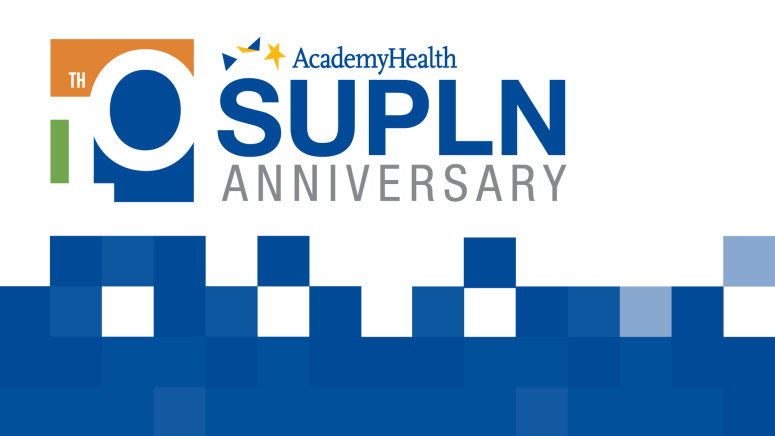
In 2014, AcademyHealth’s established a learning network for partnerships between state Medicaid and health-related agencies and their state university researcher partners who provide policy and data analytic support. The State-University Partnership Learning Network (SUPLN) promotes the generation and use of evidence in state health policy and decision making, with the aim to positively impact Medicaid-based health care, addressing health inequities and improving patient outcomes. Comprised of 33 state-university partnerships across 29 states, SUPLN allows for open dialogue and peer learning to share priority areas of interest as well as analytic and methodological approaches to inform critical policy decisions. While individually, each state-university partnership offers a powerful value proposition for timely, high-quality evidence generation and application, the value provided by the built peer relationships across these state partnerships is equally immeasurable.
While these partnerships vary in their type of contractual arrangement, they share a fundamental function in their service to their respective states by providing expert analytic expertise in working with their state’s Medicaid administrative data, along with related data sources (e.g., housing, hospital discharge data, TANF, WIC, vital statistics, etc.). Some university partners also serve as their Medicaid programs data warehouse, which also utilizes their capacity and expertise to link with those additional key data sources critical in measuring health related social needs.
Impact
These partnerships have proved mutually beneficial. They provide Medicaid programs with ready access to policy and data analytic skills typically not filled by agency staff. Further, Medicaid programs are eligible for federal financial match for specific research- and evaluation-related administrative expenditures, allowing states to support research rigor and evidence generation, while maintaining fiscally sound budgets. Similarly, their public university partners benefit from consistent funding to support growth in their policy and scientific community of emerging research professionals. These public university research partners also have access to timely Medicaid data, which further advances their expertise and the Medicaid research field. Lastly, these trusted relationships with state partners provide an invaluable opportunity for researchers seeking to bear impact, by generating evidence for real world application to improve the lives of those enrolled in Medicaid.
Time of Exploration
In 2017, as the analytic capacity of partnerships expanded, they explored and affirmed their shared capacity to establish a distributed research network (DRN), akin to the FDA Sentinel or PCORnet, whereby partners could conduct multi-state, comparative Medicaid analyses. This assessment was further affirmed by a pilot study comparing variation in Medicaid treatment and outcomes among Medicaid enrollees receiving opioid use disorder (OUD) services across six states, and spurred the collaboratively led, 14 state Medicaid Outcomes Distributed Research Network (MODRN). MODRN was founded on a collective commitment among the states’ Medicaid Medical Directors and their public university research partners to generate much needed evidence to Medicaid programs on OUD and other high-priority topics, such as, housing and reproductive health, and contributes to the scientific knowledge base among emerging Medicaid researchers.
Strategic Growth
In the last few years alone, our Network and partnerships have experienced extensive growth, serving their states’ advancing needs and providing comparative state analyses for federal partners. As the pandemic exposed persistent disparities in our health care system, Medicaid programs, often included in multi-agency COVID-19 responses, are well-positioned to explore inequities in health care given the communities they serve experience notable disparities across health and social services. These academic partnerships have seen a broadening in the array of work and depth of analytic capacity required, including COVID-19 tracking and monitoring, Medicaid/CHIP eligibility unwinding following the Public Health Emergency, and Medicaid and social determinants of health-related data sources.
These public university researchers now contribute to the full spectrum of Medicaid policy development support, from understanding the scope of the issue to program evaluation, and commonly provide analytic support related to health profiles of Medicaid enrollees, service utilization, program spending, enrollment trends, access to care, quality of care, health outcomes of Medicaid enrollees and policy and program evaluations.
And Network federal partners have sought the collective analytic expertise to explore a variety of topics among the Medicaid population, including polysubstance use prevalence, impact of doula program implementation on health and severe maternal morbidity, sexually transmitted disease screening and clinical care adherence, OUD treatment and outcomes, permanent supportive housing and health disparities, and measuring impacts of long COVID.
Conclusion
This 10-Year Anniversary milestone not only provides an opportunity to marvel at how far we have come but provides cause to reflect on the facets unique to our Network that have enabled these partnerships to thrive. Over the next several months, in honor of our anniversary, please look for our special blog series that will include reflections on our growth and the very value propositions that enable and strengthen these partnerships, showcase the collective research and future areas of focus for MODRN, highlight emerging health services researchers in Medicaid and how such partnerships strengthen their scientific knowledge, and elevate future opportunities we are seeking to explore.
In the meantime, please look for your SUPLN and MODRN peers' presentations, posters and booths at AcademyHealth’s Annual Research Meeting in Baltimore this June 29-July 2 and grab a SUPLN and/or MODRN ribbon so you can identify yourselves.